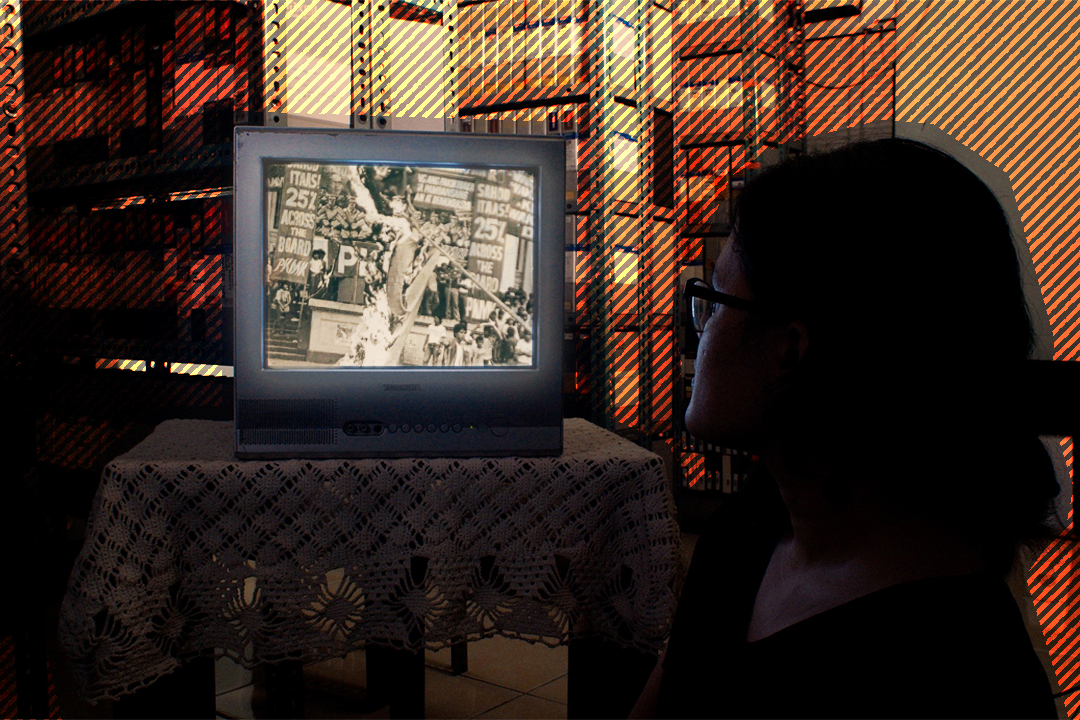‘Invisible Labor’: Preserving the Truth, One Rewind at a Time
‘Invisible Labor’: Preserving the Truth, One Rewind at a Time
Feature art by Abigail Manaluz
In the broader struggle for social justice, some battles often go unnoticed but are essential for advancing long-sought-for change. In Invisible Labor, filmmaker Joanne Cesario sheds light on the untold story of Cleto “Carlito” Piedad, a grassroots organizer and janitor at an independent research institution in the Philippines whose quiet yet vital work became an integral part of the Filipino people’s fight against oppression. The documentary shows how Piedad’s humble task of rewinding and preserving videotapes bridges the past and the present, ensuring that future generations will be able to grasp the pain and horrors experienced under the late dictator Ferdinand Marcos Sr., and the haunting echoes under his son and incumbent president, Ferdinand Marcos Jr.
But Piedad wasn’t always an organizer. He was a man of humble beginnings, whose political consciousness awakened during the fascist rule of Marcos Sr. This led him to grassroots political work, where he organized with and for marginalized communities. Eventually he found himself working as a utility worker at IBON Foundation, an independent research institution. From 1998 to 2006, Piedad devoted his lunch breaks to rewinding and meticulously maintaining videotapes that documented the resistance of the Philippine Labor Movement, particularly the history of Kilusang Mayo Uno since its inception in 1980. His dedication to this quiet labor ensured the survival of invaluable historical records that might otherwise have been lost. Sadly, his untimely death in 2006 marked the end of this impactful yet unrecognized work.
Through interviews with his family and colleagues, Cesario pieces together a portrait of the man behind the labor. Piedad was a devoted man, deeply concerned about the plight of the marginalized. His life was a testament to the idea that even the simplest acts performed with dedication can contribute to a greater cause. His rewinding of tapes was not just an archival task; it was an extension of his advocacy, a means of keeping alive the voices of those who fought against oppression.
An archived videotape of a Kilusang Mayo Uno mobilization | Joanne Cesario
As Cesario unveils the man behind the labor, she also reflects on the current sociopolitical landscape of the Philippines. In the face of the Marcoses’ return to power, the growing tide of historical distortion and disinformation, and the persistence of the same systemic issues—union busting, forced disappearances, red-tagging, low wages, and skyrocketing prices of basic goods—Invisible Labor reminds us that the fight is far from over. Piedad’s unassuming yet vital work unknowingly became a bulwark against forgetting, helping preserve the truth in a time when lies are dangerously prevalent.
The life of Piedad is also a call to all of us to rewind, to look back on what’s come before so we can understand how to face the struggles of today. His invisible labor reminds us of the origins of these battles and the roots of resistance so we don’t lose sight of hard-won progress. It keeps alive the lessons and patterns of oppression that those in power would rather erase, urging us to resist, remember, and recognize how the present is deeply connected to the past.
Invisible and often overlooked, Piedad’s work, as documented in Invisible Labor, goes beyond archiving the past—it is a powerful act of resistance, preserving the struggles of a people and safeguarding the truth, one rewind at a time. By rewinding and retelling Piedad’s story, Cesario shines a light on the quiet heroes who safeguard history against erasure, handing the truth to a new generation and ensuring that the struggle of the Filipino people against oppression endures.
Invisible Labor is part of the QCLokal Shorts Expo program in the 12th QCinema International Film Festival.



















